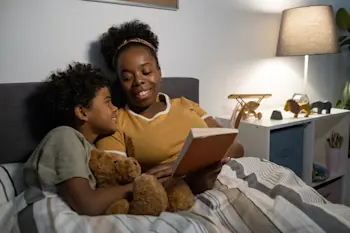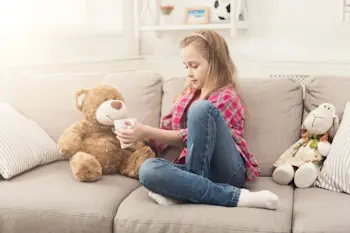Let's get talking in Early Years

Did you know one of the best ways to get children talking is through play? In this blog we look at all the wonderful ways to have fun with language at home and boost your child’s confidence in expressing themselves.
Boost your child’s speech confidence through play
Recent figures highlight that child speech delays have seen a 10% increase following the recent lockdowns with children aged 5-6 most affected. This is the year group who started reception after the first lockdown and had considerable disruption to their early years learning.
There are many reasons why a child’s speech may be delayed – physical, emotional, environmental and of course, all children naturally develop at different times. However, one area identified as a cause for the increased figures during lockdown is the reduction in play-based learning that children experienced.
What is play-based learning?
Play-based learning means to learn whilst playing. This method is employed by teachers throughout the Early Years curriculum. It recognises that children learn best when they are free to make some decisions. It’s about creating a safe environment where they can try things, make mistakes and experiment without repercussions.
How can I use play-based learning at home?
Start with some objects. It might be some arts and crafts materials or it could be some toys or props to create a pretend shop or cafe. You don’t need to tell your child what to do, you don’t need to have an end goal in mind, you can lead by demonstration e.g. ‘I think I’m going to paint a picture’ and see if they follow or take the play in a new direction.

Great ways to get talking when playing
Talking whilst playing happens in a natural rather than forced way. Start by explaining what you’re doing.
For example, I might pick up a toy cup and say ‘I’m going to make Teddy a cup of tea. He looks very thirsty.’
What happens next? Does your child decide to copy and make tea for another toy? Perhaps they decide to create a tea party. Perhaps Teddy spills his tea, hurts himself and needs to see a nurse. The possibilities are endless! Follow their lead and talk as you go.
More description less questions
I often made the mistake of asking my children too many questions. I thought it was a good way to give them choices or get them talking. Actually the opposite was true. When I asked questions it interrupted their thought process and made them hesitant. If I just spoke and described what I was doing or talked about my day then they joined in when they were ready.
So in the scenario above instead of asking my child ‘How do I make Teddy a cup of tea?’, I would say, ‘I’m going to boil a kettle with some water, this jug looks a bit like a kettle, I’m going to turn it on.’
Story time with a twist
Daily story time is another great way to build talking naturally into your time with your child. Sit together and look at a book. Have you ever tried ‘reading’ a book together without any words?
Wordless books are a wonderful way of involving your child especially if they are a reluctant reader or speaker. Raymond Briggs’ The Snowman is one of my favourites. Describe each of the pages, encourage your child to tell you what they see. Apply the same principles of play-based learning. Let your child take the lead and remember there’s no right or wrong answers.
Check out our favourite wordless books.
Always time for a nursery rhyme
Include some nursery rhymes in your play. For children that are reluctant to talk, repeating a rhyme or song they have learnt can feel more comfortable.
When singing a song together, look at your child and check they can see your mouth. Watching the way you form the words with your mouth can really help them. Try ‘Hickory, Dickory Dock’ or ‘Incy Wincy Spider’. Be expressive, exaggerate the words and have fun.
Rhymes are also a great way of introducing new vocabulary, practising numbers and helping children to recognise phonics or the sounds in words.
Make up your own rhymes to accompany your day whether it’s getting ready for school or getting ready for bed it can be fun to make up songs together.
Getting support
If you’re worried that your child is struggling to talk then help is available:
Try the progress checkers created by Speech and Language UK. They will give you an idea of how your child is developing and what help is available if you need it.
Chat to your teachers at school. Do they share your concerns? Have they found some techniques that are working in the classroom?
Book an appointment with the Speech and Language UK enquiry service for a free 30 minute consultation to discuss your concerns.
Consider a tutor. Face-to-face interactions are best for children who struggle to talk. Why not visit your local Explore Learning centre and meet tutors who can boost your child’s confidence and coach them to achieve their next learning goals.
For more ideas check out our free early years resources collated to help parents, carer and educators support young children in their learning and development.
Cancel anytime
No joining fee
In centre or online
Memberships to suit you
Cancel anytime
No joining fee
In centre or online
Memberships to suit you
Cancel anytime
No joining fee
In centre or online
Memberships to suit you




